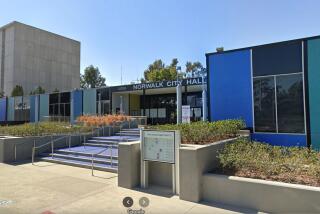Vote on Plan for Card Club Is Rejected : Gambling: The owner of the Saddleback Inn in Norwalk vows an initiative drive on adding an 80-table casino. The City Council cites concerns over crime and traffic problems.
- Share via
NORWALK — Taking a strong stand against gambling, the City Council unanimously rejected a proposal that would have allowed voters to approve the city’s first casino in the November election.
Moments after Tuesday night’s vote, hotel owner D.J. Brata vowed to start an initiative drive on adding an 80-table card club to his Saddleback Inn on Firestone Boulevard.
Brata said he hopes to collect enough signatures to put the issue before city voters in a special election in February or March, 1991.
“I’m very disappointed,” said Brata, 33, who had pleaded with the council to let residents decide the issue. “I thought it was totally unfair.”
But council members expressed concern that gambling could bring more crime, traffic and parking problems to this city of 90,000 residents. Brata’s proposal also came under scrutiny because George Hardie, a minority partner in the controversial Bicycle Club of Bell Gardens, would be a partner in Brata’s Norwalk casino.
Brata’s pledge to start an initiative campaign portends a fierce battle in coming months. Mayor Luigi A. Vernola served notice that he will campaign to keep the card club out of Norwalk.
“I’ve lived here all my life,” Vernola said. “I want to protect the interests of my family.”
There was standing room only in the council chambers, as Brata outlined his proposal to spend $25 million to build the card room and renovate his 250-room hotel. Two new restaurants would be added, as well as new banquet and meeting rooms, he said. It would be called the Norwalk Plaza Hotel and Casino.
Brata said the new complex would mean at least $1 million a year in gaming-tax revenue for the city. New business attracted by the casino would also increase the bed-tax revenue the city receives from the Saddleback Inn, he said.
Brata also said his proposal would create 750 new jobs, most of which would be filled by Norwalk residents.
The hotel has been struggling financially, Brata said, with a 40% occupancy rate.
As of June 25, Brata owed the city $35,730 in outstanding taxes, interest and penalties, City Manager Richard R. Powers said.
Nineteen residents and business people testified in favor of a November vote. Some said they would welcome a casino because of the jobs and revenues it would generate, money that could be spent on providing child care and other city services.
“We need someone to help us upgrade our neighborhoods, and this is a great way to do it,” resident Alicia Ortiz said.
Others expressed no opinion on the casino but said they have a right to vote directly on such an important issue.
About an equal number of residents, local clergy and a representative of the United Neighborhoods Organization spoke against the casino and against such a popular vote, contending that gambling would bring loan-sharking, bookmaking, prostitution and political corruption into Norwalk.
“It will absolutely control our city and our residents, as well,” resident Pat Gallie said. “There is a corruptive aura about a card club. It worries and scares me to death.”
The recent legal problems of the Bicycle Club in Bell Gardens cast a shadow over Brata’s proposal because Hardie, general manager and part owner of the club, would be Brata’s partner in the proposed casino.
The Bicycle Club was seized by the federal government in April and placed under Bell Gardens municipal control. A federal jury in Miami found four men guilty in a complex racketeering scheme that involved investing drug-smuggling profits in the building of the club, among other ventures. One of those men was a partner of a group that owns a 65% interest in the Bicycle Club.
Hardie holds a controlling interest in another partnership that owns the remaining 35%. The U.S. attorney’s office in Miami has said Hardie’s partnership was not involved in wrongdoing in the Bicycle Club case. Hardie, 56, who testified as a government witness during the three-month trial, said he did not know that drug money had been used to help build the club.
Council members appeared troubled when Brata said he did not know how much interest Hardie would hold in the club and who the other investors would be.
“We don’t even know all the facts,” Vernola complained.
At that point, Brata and Hardie told the council that holding a special election would be more costly than placing the issue on the general-election ballot in November.
Brata will need signatures from 10% of the city’s 35,365 registered voters to force a vote. A special election would cost the city about $40,000, City Clerk Mary Paxon said, while Norwalk would have to pay $25,000 to place the question on the November ballot.
“Are you offering us an ultimatum?” Councilman Robert J. Arthur asked the casino backers.
Hardie countered that the council should be aware that “the initiative situation is alive and well in California.”
The campaigning had already started by Tuesday night’s meeting. Brata sent a mailer Saturday to some Norwalk voters lauding the benefits the casino would bring to the city.
He also mounted a petition campaign, which included stationing paid gatherers at local markets. Brata presented the council with what he said were 3,500 signatures from local residents asking for the vote.
Local church groups also organized a petition and letter campaign in opposition to the casino. Letters and signatures of more than 100 local residents and clergymen were presented to the council.
More to Read
Sign up for Essential California
The most important California stories and recommendations in your inbox every morning.
You may occasionally receive promotional content from the Los Angeles Times.










